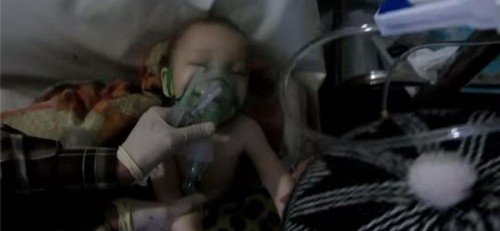LATEST
- “High-Ranking Source”: Assad Fires Both Head of Political Security and Head of Military Intelligence
- Local Doctor: About 1,500 People Contract Hepatitis A in and near Damascus
The US is deeply disturbed by reports of the latest chlorine attack by President Assad’s forces, Secretary of State John Kerry said in a statement on Thursday:
We are looking very closely into this matter and considering next steps. While we cannot yet confirm details, if true, this would be only the latest tragic example of the Assad regime’s atrocities against the Syrian people, which the entire international community must condemn.
Kerry continued:
The international community cannot turn a blind eye to such barbarism. As has been well documented, the Assad regime continues to terrorize the people of Syria through indiscriminate airstrikes, barrel bombings, arbitrary detention, torture, sexual violence, murder, and starvation. The Assad regime must be held accountable for such atrocious behavior.
Kerry did not mention any specific response, but said the chlorine attack would be “a direct violation of UN Security Council Resolution 2209” — adopted two weeks ago — “which specifically condemned the use of chlorine as a chemical weapon in Syria and made clear such a violation would have consequences”.
On Monday, Syrian helicopters dropped four barrel bombs on Sarmin in Idlib Province. Videos and doctors testified to victims suffering from breathing difficulties and other symptoms of a chlorine attack.
Six members of a family, including three children, were killed, and more than 100 were injured.
See Syria Daily, March 17: Reports — Chlorine Bombs Kill and Wound Scores in Idlib Province
Syria Video Feature: Victims of Monday’s Chlorine Attack in Idlib Province
Syrian helicopters also carried a series of chlorine attacks last spring in Hama and Idlib Provinces, killing at least 14 people and wounding hundreds.
“High-Ranking Source”: Assad Fires Both Head of Political Security and Head of Military Intelligence
A “high-ranking source” has told AFP that President Assad has fired both his Head of Political Security and Head of Military Intelligence.
The dismissal of General Rustom Ghalazeh, the head of political intelligence and liaison with Iranian officials, emerged last month after he was placed in intensive care in a Damascus hospital. Some reports said he was beaten on the orders of Shehadeh; others said he may have been shot in the shoulder at his home in Qarfa in Daraa Province in southern Syria
Shedaheh’s firing had not been reported before today.
A well-placed EA source said Ghalazeh was wounded and fired after he had told fighters that Qardaha, the ancestral home of Assad, could be taken by rebels but Qarfa must be defended. AFP’s source reinforced this, saying that “the two men were replaced after a violent argument over Ghazaleh’s involvement in the southern front”, as Shehadeh “was categorically opposed to [Ghazaleh] taking part in the battle” against rebels.
The source said Ghazaleh is in “critical condition” after complications related to hypertension.
Ghazaleh has been replaced by his former deputy, Nazih Hassoun, with Mohamed Mahalla taking over as military intelligence chief.
Before becoming head of political security, Ghazaleh was prominent in his role as head of Syrian military intelligence from 2002 to 2005 during its occupation of Lebanon.
Local Doctor: About 1,500 People Contract Hepatitis A in and near Damascus
About 1,500 people in and near Damascus have contracted Hepatitis A, according to Ammar Aisa, a doctor in the Damascus suburb of Yalda:
There’s a number of [contributing factors], most important being the lack of food and water. People nowadays will eat anything they can find, with farmers in some cases resorting to irrigating their land with sewage water. This causes locally produced vegetables, people’s main source of food in southern Damascus, to become contaminated and dangerous. All this causes the spread of diseases and epidemics.
Aisa says his estimate of those affected is conservative: “This is just the number of people we’ve been able to register and keep track of. There are those who haven’t been taking their children to the hospital because they know there’s no available treatment for the disease.”
He adds that Hepatitis A is “spreading quite rapidly, due to the deteriorating living conditions in southern Damascus as a result of the blockade imposed by the regime, which has caused clean water people receive from utilities to be cut off”.

